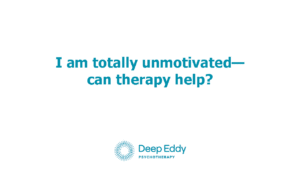Charlotte Howard, a therapist at Deep Eddy Psychotherapy in Austin, TX, talks about motivation and procrastination and how, often times, the best medicine is to find others who will support you, while learning to love yourself.
Q: I’m just totally unmotivated to do anything, where does motivation come from? Where do I get that? Why am I such a procrastinator?
We really want motivation to come from loving yourself. If you’re being a good parent to yourself, you can motivate from a place of caring what happens to you. You might say, “Oh, that would be fun to succeed at work or to get this done so that I can relax deeply.”
It’s about taking care of yourself, “It’d be fun to cook dinner so I’ll enjoy eating it!” But if you motivate from perfectionism or by demanding, “You should do it this way!” it often leads to anxiety or shutting down the real self. When you shut down you can become a shell of a person–tragically absent from your real self and living to please others. Some people can be extremely motivated throughout life from that place of perfectionism, but you start to lose the sense of them.
Most people rebel against motivation that comes from being hard on yourself, just as we would ultimately rebel against a critical or demanding parent or boss. The way we really want to be motivated is just by taking care of ourselves—learning to love yourself and asking things of yourself from this place of love and nurturance. Loving yourself is creating a beautiful, healthy relationship with yourself so that you can enjoy life and also have success in the world and in your relationships.
Q: What about procrastination?
Procrastination is really masochistic. Underneath it is often anger and rebellion against life. People procrastinate to rebel when others tell them that they or the world should be a certain way that might lead to loss of self or represent values their unconscious can’t get behind. Often, however, in the rebellion they end up hurting themselves.
Someone might say, “I’m not going to jump through those hoops!” which may truly be meaningless or silly hoops to jump through, but then they end up suffering in the world because they are paralyzed instead of moving forward. The longer you procrastinate, the more anxious most of us get about whatever we have to do. We’re going to have to do it anyway, so if we knock it out right away, then we’re free to just fully enjoy the rest of our day.
Learning Mercy
If there’s some opportunity before you, but you really don’t want to do it, sometimes the mercy is to just not do it. Maybe it’s more beautiful to stay where you are and say, “I don’t really want that.” If that’s true, though, don’t hold it over your head to feel bad about yourself for how you are not accomplishing it. If your deep heart, however, really wants to go for it and you’re just procrastinating, then it’s time to look at the underlying reasons–whether it’s fear of failure or wanting to prove you are lovable without having succeeded at whatever it is, etc.
Uncovering Fear of Failure in Therapy
Often fear of failure underlies our procrastination. Whether anxiety, rebellion, or other deep reasons—maybe it’s just a hard thing to do and we need courage–we need active support from ourselves and others to shore us up and give us the energy and confidence to go for it. In therapy we explore and heal the underpinnings of what is holding you back while providing whatever practical support and problem-solving that might make your goals feel more organized, clear, and less overwhelming.
Finding More Motivation with Therapy in Austin, TX
We would love to invite you to make a complimentary call to discuss some of your options and determine whether Deep Eddy Psychotherapy in Austin, TX is the right fit for you and your situation. Please contact us using the links below or in the sidebar and share this post or video if you found it to be valuable. Together we can create a world of well-being and joy.

